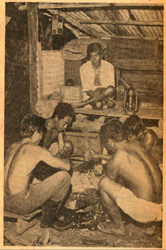

By Carl PurcellPONAPE (Micronesia) - I was somewhat apprehen-sive about accepting the in-vitation to the sakau party. It's not that I'm adverse to trying new things, but I had heard stories about the narcotic effects of sakau, a Ponapean drink prepared from the roots of a pepper plant. I had heard it was foul-tasting. 1 had heard it was the South Pacific's version of LSD. But reports were conflicting arid I decided to see for myself.
Ponape is an island sever-al days by boat from. Truk and both are in Micronesia, the American Trust Territo-ry of the Pacific, for which the central international air-port is on Guam.It is an isolated island of volcanic origin, lush and green with sheer rock bluffs rising out of the jungle.
From a distance it wears a crown of clouds that seem to conform to the shape of the land mass.The sparkling blue-green water of the lagoon has a necklace of white surf breaking over the barrier reef.
There is no landing strip, but a seaplane sets down once a week in the lagoon. It is a quiet, sleepy island that has not made it into the 20th century.
The sakau party was held in the village of Wone. The age-old ritual starts at sundown as natives pound the root of the pepper plant between two rocks. The soggy pulp is placed between the strands of shredded hibiscus fiber and then twisted like a wet dishrag. Drippings are caught in split coconut shells. The best that can be said for the resulting libation is that it's fresh, but freshness can include such things as struggling insects, s t o n e chips and perspiration.
Protocol demands the visi-tor sip from at least five fresh cups, and the dark, gummy liquid often strings like rubber cement or bub-ble gum from cup to lip.The first few sips turned my tongue and lips numb, very much like a shot of no-vocaine. My host, a Jesuit priest, assured me the ef-fects were temporary and harmless . . .with the bless-ings of the Church. I contin-ued to sip.
It was a weird, primitive scene. Six of us sat under a small lean-to, faces reflect-ing the flickering light of a kerosene lamp that pushed back the intense blackness of the jungle night. There was a chorus of insects and night birds.
Light, cold sweat broke out on my face and I had difficulty in swallowing. I felt as if a gummy string of sakau was stretching from the cup all the way to my stomach.
I had fulfilled my social obligations. I excused my-self and retired, sinking back under my mosquito netting, numb from the waist up.Sleep did not come right away and I could hear the occasional beating of rocks as my Ponapean friends laughed and drank into the night.
Next morning I still heard the rocks. Could the party still be going on in my host's room? Incredible. I pushed open the door toi find a transisitor radio emitting the telltale sounds. The Ponape radio station has, adopted the sakau rock beat as its musical theme